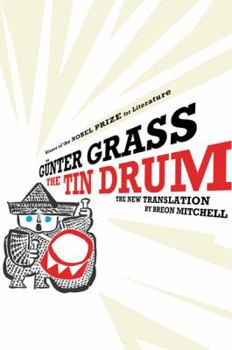Book Overview
One of the greatest modern novels, The Tin Drum is the story of thirty-year-old Oskar Matzerath, who has lived through the long Nazi nightmare and who, as the novel begins, is being held in a mental... This description may be from another edition of this product.
Format:Hardcover
Language:English
ISBN:0151014167
ISBN13:9780151014163
Release Date:January 1959
Publisher:Houghton Mifflin
Length:582 Pages
Weight:1.81 lbs.
Dimensions:1.6" x 6.4" x 9.1"
Customer Reviews
3 ratings
Not all that magical
Published by Thriftbooks.com User , 14 years ago
This was one of the huge German novels of the 20th century, in a class with Alexanderplatz, or Zauberberg, or Radetzkymarsch, or Prozess. When it came out it was a sensation, mostly for its unusual openness about all kinds of things that were considered taboo or `in bad taste'. The 50s in Germany were a time of odd prudishness, especially when compared to the 20s. Of course the 12 years from 33 to 45 had shifted all values and perceptions. Published in 1959, Blechtrommel covers roughly the period from the beginning until the middle of the century, with most of it set in the second quarter century. Its big subject is Germany and its relations with Poland. For that purpose it is ideally located in Danzig/Gdansk, a Baltic Sea port that changed its nationality a few times: it has been German, it has been a `free city', and it has been and is Polish. This kind of shifts and changes always comes with trouble between the involved ethnic groups. And trouble there was plenty. On a micro level, we have the story of Oskar, the tin drummer, as told by the man himself. Born in the 20s, he is an early developer, intellectually mature at birth, and quickly able to decide that his `father' is not his real father, and that he dislikes his petit bourgeois milieu so strongly that he stops growing by an act of willpower at the age of 3. Oskar is a dwarf with an intellectual mind. His father is a Nazi and Oskar is a miniature `inner emigrant'. His real father, he thinks, is his mother's Polish cousin. He rejects the term resistance for the minor disturbances that he causes. His first skill is drumming, and he can upset any public music by imposing a waltz on a march etc. His second skill is: he can destroy glass by his voice, and he uses that for all kinds of mischief. Grass has been called one of the fathers of `magical realism'. However, for all its imagination, I have to admit that I find the writing disappointingly dry. Grass is no magician with the German language. I am not sure, of course, how his translators handle him. I re-read the tin drum now with a sense of curiosity but little enchantment. Grass has been politically active, supporting the Social Democrats since Willy Brandt's time in the 60s/70s, but more or less splitting off since the reunification. He argued against that. His status as a moral authority has been somewhat diminished after he outed himself rather late in his life as a former Waffen SS volunteer. Had he not kept that secret for decades, his image might not have been damaged by it. It has nothing to do with the quality of the book, of course.
Günter Grass: Die Blechtrommel
Published by Thriftbooks.com User , 15 years ago
I received this item in a very timely fashion at a reasonable price. It was in better condition than stated. I am very pleased with my transaction. Recommended seller.
Granted: I am an inmate of a mental hospital
Published by Thriftbooks.com User , 20 years ago
The Tin Drum is a crazy, anecdotal novel that chronicles the adventures of Oskar, who is a cross between Rumplestiltskin and Peter Pan. He identifies himself sometimes as Jesus, sometimes as Satan. At thirty, Oskar is an inmate of a mental hospital (as noted in the first sentence of the book) and is still pounding on the same model of drum he received when he was three. Through his perceptive eyes, we get an image of Germany in the 30s and 40s, its dissidents, its criminals, and its entertainers. Oskar is selective in what he tells us. For example, we know his alleged father can "turn feelings into soup", but we don't know his function in the Nazi party. We know about every nurse Oskar meets, but his encounters with the military are kept to a minimum. The pre and post-war situation is almost just a background, and Oskar rarely comes upfront and comments about the horror of the times. He expresses his feelings through his drum, interrupting party speeches and causing mayhem on the streets by breaking windows with his voice. The insanity of the world is not seen on a grand scale, but through the demise of individual characters.He has a great eye for catching all the little nuances of humanity, and the characters Oskar describes are unforgettable in their quirks. After reading the first paragraph about the saving grace of the four potato colored skirts, you won't be able to put it down. My favorite chapter is "On the Fibre Rug," but you'll have to make it to the end for that one. This book is a thoroughly enjoyable and witty read. No book has ever made me laugh so much, or writhe so much in discomfort. It's magical, it's real, it's perceptive, it's a must read.
The Tin Drum Mentions in Our Blog

The Essential John Irving
Published by Ashly Moore Sheldon • March 01, 2021
This week we celebrate the birthday of acclaimed American-Canadian author John Irving, born on March 3, 1942. With a career that has spanned five decades, his work is marked by a tension between tradition and nonconformity, reverence and rebellion. Here we highlight five of his essential titles, as well as their screen adaptations.






